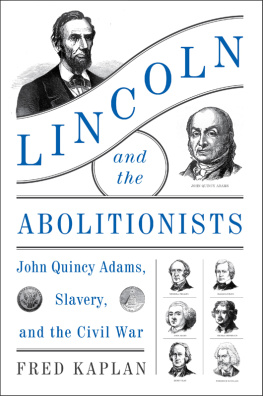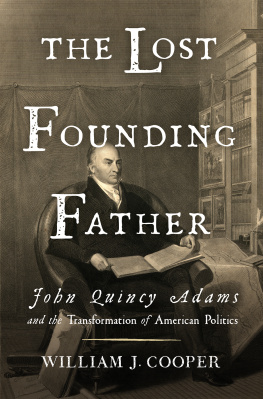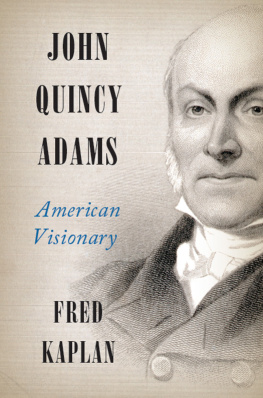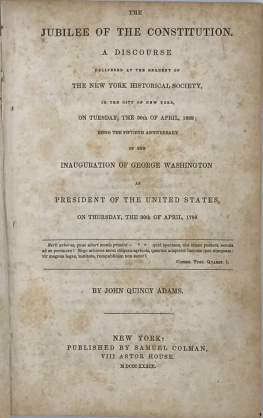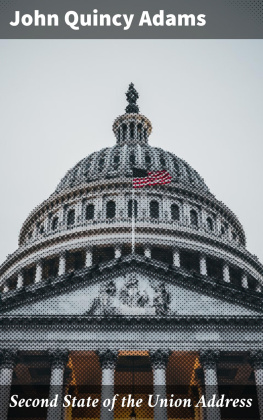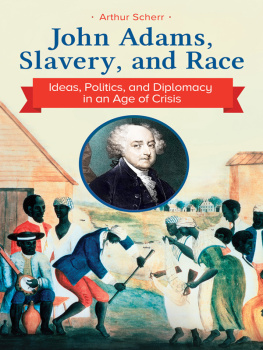Adams John Quincy - Lincoln and the abolitionists: John Quincy Adams, slavery, and the Civil War
Here you can read online Adams John Quincy - Lincoln and the abolitionists: John Quincy Adams, slavery, and the Civil War full text of the book (entire story) in english for free. Download pdf and epub, get meaning, cover and reviews about this ebook. City: USA, year: 2017, publisher: HarperCollins, genre: Non-fiction. Description of the work, (preface) as well as reviews are available. Best literature library LitArk.com created for fans of good reading and offers a wide selection of genres:
Romance novel
Science fiction
Adventure
Detective
Science
History
Home and family
Prose
Art
Politics
Computer
Non-fiction
Religion
Business
Children
Humor
Choose a favorite category and find really read worthwhile books. Enjoy immersion in the world of imagination, feel the emotions of the characters or learn something new for yourself, make an fascinating discovery.
- Book:Lincoln and the abolitionists: John Quincy Adams, slavery, and the Civil War
- Author:
- Publisher:HarperCollins
- Genre:
- Year:2017
- City:USA
- Rating:3 / 5
- Favourites:Add to favourites
- Your mark:
- 60
- 1
- 2
- 3
- 4
- 5
Lincoln and the abolitionists: John Quincy Adams, slavery, and the Civil War: summary, description and annotation
We offer to read an annotation, description, summary or preface (depends on what the author of the book "Lincoln and the abolitionists: John Quincy Adams, slavery, and the Civil War" wrote himself). If you haven't found the necessary information about the book — write in the comments, we will try to find it.
Lincoln and the abolitionists: John Quincy Adams, slavery, and the Civil War — read online for free the complete book (whole text) full work
Below is the text of the book, divided by pages. System saving the place of the last page read, allows you to conveniently read the book "Lincoln and the abolitionists: John Quincy Adams, slavery, and the Civil War" online for free, without having to search again every time where you left off. Put a bookmark, and you can go to the page where you finished reading at any time.
Font size:
Interval:
Bookmark:
It is sensible to state that with this book, as with my last two, my major indebtedness is to the new digital world, to the computer technology that has revolutionized historical and literary research. I remember the index cards and the steel index card box in which, fifty years ago when I wrote Thomas Carlyle: A Biography , I stored my research notes. And the thousands of miles I traveled and the months I spent in faraway archives for my next three biographies. Now the computer on my desk has become the portal to websites that provide access to most of the manuscript archives and book collections of the world. Scholarly writers, especially biographers, have had our writing lives cushioned and extended. Also, the organization of digitalized files makes possible a tidiness and an accessibility that not even a compulsive arranger could have managed before. And my word-processing program has allowed me to write better than I ever could without it. Revision is the lifeblood of a good writer. The computer has given me the chance to write and rewrite almost painlessly.
Complicated legal and cultural problems have arisen in regard to who benefits and who loses (especially institutionally) from this new world of online resources. Not everyone is a winner. Libraries have to redefine themselves and retool, an expensive activity. And the application of this technology to the buying and selling of books creates its own issues. Many independent bookstores have gone out of business. Chain bookstores have had to adapt. And Amazon dominates the book marketplace. This extraordinary company, though, has made its own positive contribution to my life as a writer. In many instances, I need actual physical books. The irony for professional nonfiction writers like myself, who have chosen to live at a distance from research libraries, is that, just as it radically transforms the book marketplace, Amazon also delivers to my door overnight almost all the books I need. For someone who now lives in Boothbay, Maine, that is a great asset.
Still, the magic of computers and next-day delivery notwithstanding, there are particular libraries that have been frequent presences in the creation of this book. Nearby, the excellent Bowdoin College Library and its ever-helpful staff; at greater distances and mostly online, the Massachusetts Historical Society, the Library of Congress, and the Gilder-Lehrman Institute. There are a number of people, some connected with institutions, others not, who have been of particular help. Douglas Wilson has kindly shared with me his expertise about Jefferson and Lincoln. At the Massachusetts Historical Society, Emily Ross has provided a much-needed scan of a Charles Francis Adams diary entry, and Dan Hinchen offered helpful guidance in regard to Adams and Elijah Lovejoy. Bill and Jane Ann Moore, the foremost experts on Lovejoys life and writings and co-directors of the Lovejoy Society at Princeton, Illinois, have generously helped with source material and guidance. Penny White at the Albert and Shirley Small Special Collections Library at the University of Virginia has helped with a scan of a letter from Charles Fenton Mercer to John Hartwell Cocke.
The image archives that have permitted me to reproduce items in their collections are separately acknowledged, but the people who have helped facilitate this warrant acknowledgment: Erin Beasely, the National Portrait Gallery; Joshua Blay, the Philadelphia History Museum at the Atwater Kent; Jaime Bourassa, the Missouri History Museum; Caroline Keinath, the Adams National Historical Park, National Park Service; Bruce Kirby, the Library of Congress; Ellen Sandberg, the Granger Collection; Tatyana Shinn, the State Historical Society of Missouri; and Patricia H. Svoboda, the National Portrait Gallery.
My apologies to those who have been rewarded for their curiosity about what I was writing with mini-lectures when a sentence or two would have been appropriate. And my thanks to those who didnt let on that writers are better read than heard. To four friends, special thanks: to Peter Felsenthal for his photographic expertise; to Susan Hirschman for her warm interest and hospitality; to Charles Molesworth, who kindly read the manuscript and from whom I have borrowed his phrase about Elijah Lovejoy: an immortal ghostly shadow; and to Maureen Halmo for empathetic support on a wide range of concerns. The first reader, Rhoda Weyr, provided helpful editing; the second, Georges Borchardt, my longtime agent, has the great talent of being both magically concise and helpfully precise. My excellent technician, Mike Gudroe, has kept my computers alive and well. At HarperCollins, my thanks to my editor, Jonathan Jao, whose commitment to the book has been expressed throughout in word and deed; and to the associate editor Sofia Groopman, who has kept me informed and well chaperoned through the production process. HarperCollins has given the book the advantage of an excellent copyeditor, Jenna Dolan, an excellent proofreader, Susan Gamer, and a superlative production editorial department, led by John Jusino. My thanks for the blessing of three estimable children, Julia, Noah, and Benjamin, who amid the demands of their own lives find moments in which to be interested and encouraging.
Fred Kaplan
Boothbay, January 2017
John Quincy Adams: American Visionary
Lincoln: The Biography of a Writer
The Singular Mark Twain: A Biography
Coffee with Mark Twain
Gore Vidal: A Biography
Henry James: The Imagination of Genius
Charles Dickens: A Biography
Thomas Carlyle: A Biography
Sacred Tears: Sentimentality in Victorian Literature
Dickens and Mesmerism: The Hidden Springs of Fiction
Miracles of Rare Device: The Poets Sense of Self in Nineteenth-Century Poetry
F RED K APLAN is Distinguished Professor Emeritus of English at Queens College and the Graduate Center of the City University of New York. His books include Lincoln: The Biography of a Writer , which was a finalist for the Lincoln Prize; John Quincy Adams: American Visionary ; and Thomas Carlyle , which was a finalist for the National Book Critics Circle Award and the Pulitzer Prize. He is the author of biographies of Charles Dickens, Henry James, Mark Twain, and Gore Vidal. He lives in Boothbay, Maine.
Discover great authors, exclusive offers, and more at hc.com .
Australia
HarperCollins Publishers (Australia) Pty. Ltd.
Level 13, 201 Elizabeth Street
Sydney, NSW 2000, Australia
www.harpercollins.com.au
Canada
HarperCollins Canada
2 Bloor Street East - 20th Floor
Toronto, ON M4W 1A8, Canada
www.harpercollins.ca
New Zealand
HarperCollins Publishers New Zealand
Unit D1, 63 Apollo Drive
Rosedale 0632
Auckland, New Zealand
www.harpercollins.co.nz
United Kingdom
HarperCollins Publishers Ltd.
1 London Bridge Street
London SE1 9GF, UK
www.harpercollins.co.uk
United States
HarperCollins Publishers Inc.
195 Broadway
New York, NY 10007
www.harpercollins.com

O n a blessedly cool early morning in late October 1837, after what had seemed an endless Washington summer, seventy-year-old congressman and ex-president John Quincy Adams, having recently returned to the nations capital from his Massachusetts home, opened his morning newspaper. The advertisement he read in the National Intelligencer startled him. It was headed Sale of Slaves: a mother and two of her children, the property of James H. Birch, a well-known slave dealer, were to be auctioned at four oclock that afternoon by Edward Dyer, auctioneer and corn merchant. It riveted his attention.
Next pageFont size:
Interval:
Bookmark:
Similar books «Lincoln and the abolitionists: John Quincy Adams, slavery, and the Civil War»
Look at similar books to Lincoln and the abolitionists: John Quincy Adams, slavery, and the Civil War. We have selected literature similar in name and meaning in the hope of providing readers with more options to find new, interesting, not yet read works.
Discussion, reviews of the book Lincoln and the abolitionists: John Quincy Adams, slavery, and the Civil War and just readers' own opinions. Leave your comments, write what you think about the work, its meaning or the main characters. Specify what exactly you liked and what you didn't like, and why you think so.

